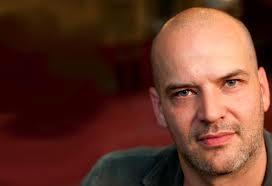|
Symphony
FROM THE NEW WORLD TO THE OLD WORLD
by Peter Lert
Saturday, June 14, 2025
Chamber
MC2 DUO RECITAL CLOSES 222'S SEASON
by Terry McNeill
Saturday, June 14, 2025
Choral and Vocal
CANTIAMO SONOMA'S LUSCIOUS A CAPELLA SINGING IN SEASON ENDING CONCERT
by Pamela Hicks Gailey
Sunday, June 8, 2025
Symphony
SRS SEASON ENDS WITH RESOUNDING TA-TA-TA-BANG
by Terry McNeill
Sunday, June 1, 2025
Symphony
YOUTHFUL VIRTUOSITY ON DISPLAY AT USO'S MAY CONCERTS
by Peter Lert
Saturday, May 17, 2025
Symphony
MYSTICAL PLANETS AND LIVELY GERSHWIN ORTIZ AT FINAL SRS CONCERT
by Peter Lert
Sunday, May 4, 2025
Symphony
VSO'S CONCERT MUSIC OF TIME, MUSIC OF PLACE
by Peter Lert
Sunday, April 27, 2025
VOCAL ELEGANCE AND FIRE AT THE 222'S RECITAL APRIL 26
by Pamela Hicks Gailey
Saturday, April 26, 2025
CANTIAMO SONOMA SINGS AN INSPIRED GOOD FRIDAY MOZART REQUIEM CONCERT
by Pamela Hicks Gailey
Friday, April 18, 2025
DRAMATIC SHOSTAKOVICH SYMPHONY CLOSES PHILHARMONIC'S 25TH SEASON
by Terry McNeill
Sunday, April 13, 2025
|
 |
 Baritone Florian Boesch |
A WINTER'S JOURNEY IN SPRING
by Steve Osborn
Sunday, May 11, 2014
On a May afternoon of abundant sunshine and warmth, a few hundred people gathered in Weill Hall to hear a song cycle about the bleakest of midwinters. The composer was Schubert, the singer was the Austrian baritone Florian Boesch, and the cycle was "Winterreise" (Winter's Journey), easily the saddest and most profound example of the form.
Boesch and pianist Malcom Martineau were clad entirely in black, the better to reinforce the somber mood. After reminding the audience not to applaud until after the 24th and final song, Boesch leaned up against the piano, and then unleashed his spine-tingling, wonderfully resonant voice, as soft around the edges as a kitten. Hands clasped in front, he sang the opening lines in full character: "Fremd bin ich eingezogen, Fremd zieh' ich wieder aus" (As a stranger I arrived, as a stranger again I leave).
Among his many stellar attributes, Boesch is a consummate actor. By the end of the first song, "Gute Nacht" (Good Night), he had fully established his character, a heartbroken man rejected by the woman who professed to love him back in May. Now he leaves her town and sets out alone on a winter's journey of unknown destination.
The next song, "Die Wetterfahne" (The Weather Vane) offered a strong contrast to the first. Boesch unfolded his hands and held them far apart, with fists clenched. Unlike the restraint and sad acceptance of "Gute Nacht," he now displayed flashes of anger, with a voice to back them up. That intensity continued in the famous "Gefrorene Tränen" (Frozen Tears) that followed, reaching a climax (lowmax?) in the deep bass notes of the second verse.
By the fourth song, it was clear that Boesch would enact each one differently, while confined to a few square feet in front of the piano. Hand gestures and facial expressions were his visual allies, but the real difference came in his and Martineau's musical approach to each text. His voice was by turns mellifluous, agitated, whispered, and strident. Martineau likewise displayed a full range of emotion without ever overstepping his boundaries. He always allowed Boesch to shine through.
Being Austrian, Boesch has an inherent advantage in pronouncing the text of "Winterreise." Every word was distinct and fully articulated. Final consonants came to a full stop, and vowels blended beautifully. His breath control was superb, and his upper range was as bewitching in its softness as his bass in its thundering.
As the songs rolled along, each one stood out in its own way. In the fourth, it was the despairing enactment of "Wo find ich eine Blüte?" (Where will I find a blossom?). In the fifth, it was the shift in tone to match the "dead of night." In the sixth, it was the anguished outburst at the end.
Throughout the performance, Boesch really tested the limits of his voice and character. His repeated pianissimos were perhaps the most beguiling aspect of his musical arsenal. Perched just on the edge of inaudibility, they brought a hushed stillness to the house, a quietude that was only interrupted by overanxious page turners following along in their programs. In the acting domain, Boesch emphasized his character's anger as much as his resigned acceptance of his fate.
Boesch's emphasis on contrast and duality makes him an ideal interpreter of Schubert, a composer noted for his constant fluctuation between major and minor. This fluctuation is present throughout the cycle, nowhere more so than in "Frühlingstraum" (A Dream of Spring), where the merry bird songs of the opening verse are replaced by the crowing of roosters and the shrieks of ravens.
The real pivot in the cycle comes in the 20th song, "Der Wegweiser" (The Signpost), where the traveler resolves to take a road "from which no one has ever returned." After making that vow, Boesch stood perfectly still, allowing the metronomic clock ticking in the piano to come to the fore. It was a chilling moment.
From there to the end, the intensity increased relentlessly, from a visit to the graveyard, to the traveler's delirious vision of three suns in the sky, and finally to a frozen lake, where a forlorn hurdy-gurdy man plays incessantly as he staggers back and forth, barefoot on the ice. Boesch brought yet another voice to this song, almost speaking the short, clipped phrases and then sustaining the final notes in a haunting tone of utmost delicacy.
The ovation was immediate and sustained. This was a great performance of a musical masterpiece, as full of drama as a grand opera, but enacted in a fraction of the space and with just two consummate musicians.
|
